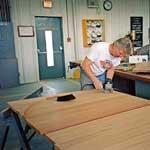Should storm-damaged states get federal aid?
- Rockdoc
-

- Mountain Legend
-

archer wrote: I know we are a nation of states, but not all the states are created equal. Some are more prone to certain natural disasters, some are not, some have a larger tax base with large urban centers, some do not. It makes little sense to have 50 states all trying to have enough disaster relief funds if the worst should happen when it may happen to one state 3 times one year and then not for 50 years, but may not happen to another state for several decades. We are, after all, ONE country and it is in our best interest to help each other when the worst happens. I'm not one to usually think the federal government is efficient....but in this case having a pool of funds at the federal level makes a lot more sense than having each state try to keep a fund big enough to cover whatever may happen.....like a 100 year flood, or the once in a lifetime tornado.
That may be the easy way out. THe Federal government is an insurance program. There is a choice in living where one does. If you elect to live adjacent to a nuclear reactor because it is cheap to do so, you take and accept the risk in doing so with the mindset that probability is on your side in terms of a disaster. Residents of states subject to tornadoes, hurricanes, flooding, etc. do much the same. And, there are many states where the probability of major catastrophes are higher than elsewhere obviously. Why do I need the federal government to collect money and have a pool of funds (often targeted for ill-conceived use other than it original intension as in SS) so it can do a poor job in getting those funds to the needy recipients. Has not the Katrina matter highlighted the government's poor handling and distribution of aid and funds? We as a people can do better than the government because we are less wasteful. Besides, it always feels good to step in and help your fellow man, and that is what made America so strong when it needed to be. A government bankroll is impersonal, and builds a degree of dependancy for a free handout without the knowledge of who did the helping. I think it is good to know the neighbors that are there for you when you need help and those who are not. So for me it comes down to building a stronger feel of community throughout the US instead of a feeling of contentiousness. They got federal funds, we did not and we deserve it just as well type of attitude, you know, the sense of entitlement in stead of personal responsibility.
Please Log in or Create an account to join the conversation.
- Residenttroll returns
-

- Mountain Legend
-

- Posts: 4630
- Thank you received: 0
The feds hired 1500 workers to administrate the fund....only $ 2.5 billion has been distributed...and now there are all kinds of abuse and fraud stories....
The government needs to get out of ambulance chasing.... Americans need to learn how to take care of each other.... I don't need or want Uncle Sam ....
Here's the mindset of Uncle Sam, fill out these 20 pages and wait. Here's the mindset of most non-profits organizations, fill up your arms and get what you need - no paperwork to fill out. Heck, the insurance companies require less paperwork for a claim than the US government.
Please Log in or Create an account to join the conversation.
- archer
-

- Mountain Legend
-

- Posts: 9964
- Thank you received: 8
I admit our government has a long way to go to be an effective manager of disaster relief programs, but why do we have to assume that we can't do better? What is it in the American people that makes them turn away and say "we can't fix that" instead of looking for ways to actually fix it?
Please Log in or Create an account to join the conversation.
- Residenttroll returns
-

- Mountain Legend
-

- Posts: 4630
- Thank you received: 0
archer wrote: And what happens rockdoc when there isn't enough personal assistance in a disaster? We read and hear about people helping others in disasters, but it's anecdotal and not always widespread. Individuals and small groups don't have the means to reach each and every person in need, so they waste both time and resources floundering around without a plan (yeah, Katrina was a perfect example of that) My daughter was part of the National medical response team and had some pathetic stories about individuals and groups who showed up to "help" but ended up drawing resources away from the actual victims of the disaster because they were woefully unprepared. Don't even get me started on how much money the Red Cross wastes and squanders in disaster relief.
I admit our government has a long way to go to be an effective manager of disaster relief programs, but why do we have to assume that we can't do better? What is it in the American people that makes them turn away and say "we can't fix that" instead of looking for ways to actually fix it?
What did the people of the San Francisco earthquake and Chicago fire do? Did they wait for uncle sam to show up? Today they are among the largest cities in the world. If the Federal Government had been involved...they would be still rebuilding.
Wow, it's incredible how liberals expect the government to solve everything.
Please Log in or Create an account to join the conversation.
- archer
-

- Mountain Legend
-

- Posts: 9964
- Thank you received: 8
residenttroll wrote: What did the people of the San Francisco earthquake and Chicago fire do? .
A lot of them died RT, collateral damage and all that.
Please Log in or Create an account to join the conversation.
- major bean
-

- Mountain Legend
-

- Posts: 2612
- Thank you received: 0
The government has no business flooding the states with money that should be paid by the insurance companies.
As far as food, clothing, shelter, etc.; that is the purpose for which charities, churches, benevolent societies exist.
Neighbors helping neighbors. That is what makes America great. That is what builds character, responsibility and backbone.
Regards,
Major Bean
Please Log in or Create an account to join the conversation.
- Residenttroll returns
-

- Mountain Legend
-

- Posts: 4630
- Thank you received: 0
archer wrote:
residenttroll wrote: What did the people of the San Francisco earthquake and Chicago fire do? .
A lot of them died RT, collateral damage and all that.
Hey Archer, collateral damage can't be avoided in natural disasters.... shame on Mother Earth! She's a terrorist and killing innocent Americans...we need to arrest her, send her to Gitmo, and put her on trial in New York City under civilian court. We must demand our government to arrest her immediately - she's killed almost 500 individuals in the last two months. Her terrorist acts are the worst since the Great Depression - she's a mean old lady...
Please Log in or Create an account to join the conversation.
- jf1acai
-

- Mountain Legend
-

Experience enables you to recognize a mistake when you make it again - Jeanne Pincha-Tulley
Comprehensive is Latin for there is lots of bad stuff in it - Trey Gowdy
Please Log in or Create an account to join the conversation.
- Residenttroll returns
-

- Mountain Legend
-

- Posts: 4630
- Thank you received: 0
jf1acai wrote: Interesting that no one has touched on the subject of federal wildfire assistance. Is that somehow different, because it affects us?
Again, it's a state issue unless it's on federal lands. No reason for the Feds to run the show in firefighting of wildland fires...
Please Log in or Create an account to join the conversation.
- Rockdoc
-

- Mountain Legend
-

archer wrote: And what happens rockdoc when there isn't enough personal assistance in a disaster? We read and hear about people helping others in disasters, but it's anecdotal and not always widespread. Individuals and small groups don't have the means to reach each and every person in need, so they waste both time and resources floundering around without a plan (yeah, Katrina was a perfect example of that) My daughter was part of the National medical response team and had some pathetic stories about individuals and groups who showed up to "help" but ended up drawing resources away from the actual victims of the disaster because they were woefully unprepared. Don't even get me started on how much money the Red Cross wastes and squanders in disaster relief.
I admit our government has a long way to go to be an effective manager of disaster relief programs, but why do we have to assume that we can't do better? What is it in the American people that makes them turn away and say "we can't fix that" instead of looking for ways to actually fix it?
I do not know where you got your perception for the final statement, but why would our military units not serve better to coordinate the distribution of basic needs. They deal with such matters all the time. You can start with the cooks setting up to feed the masses both the helpers and the needy, then use the quartermasters to distribute basic clothing and other items, the core of engineers to address construction issues, be it housing or infrastructure, and a central command set up to coordinate those who actually want and can help in person. I'm sure others can come up with other possible applications. It's just an idea since I agree much of the "confusion" came from a slow response and too many groups who lacked coordination. Thus if we had it understood that the military will step in in all such cases, the expected response would be far quicker and more effective.
Please Log in or Create an account to join the conversation.






